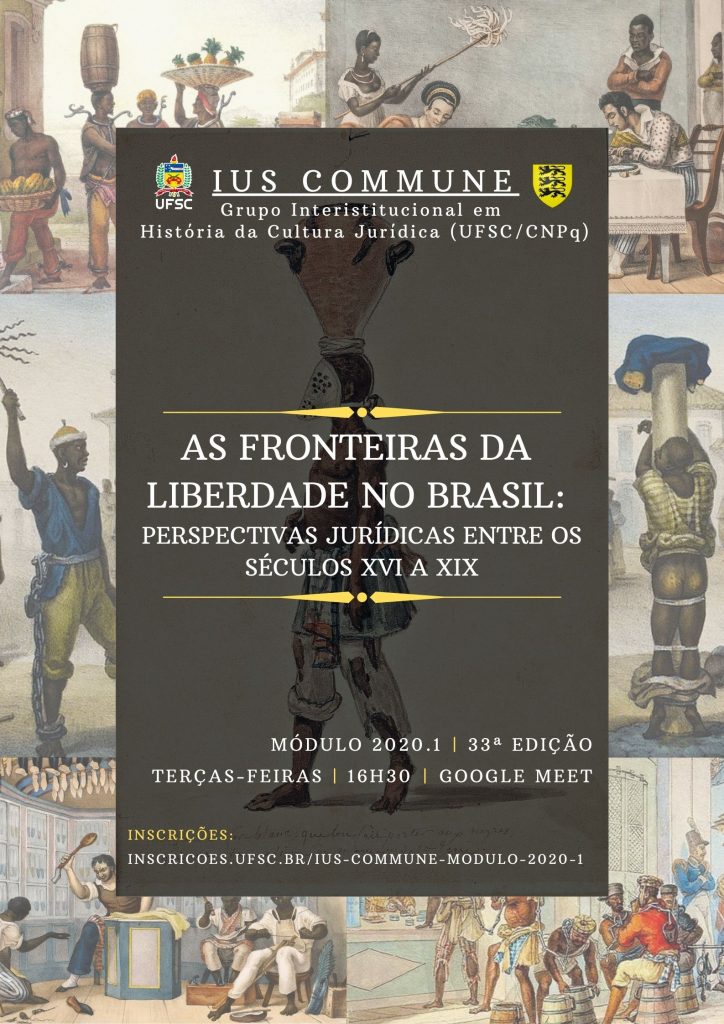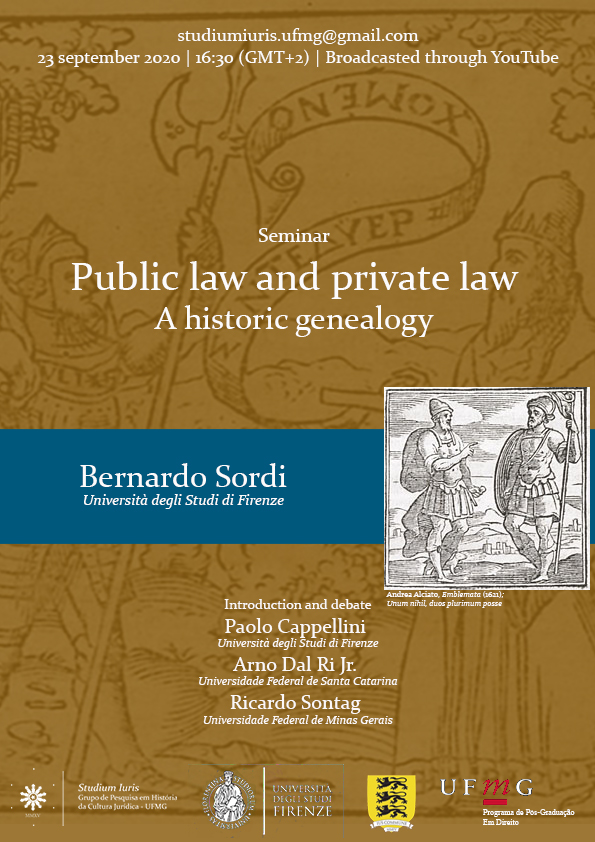
The Ius Commune – Interinstitutional Group on The History of Legal Culture – UFSC/CNPq, coordinated by Professors Ds.Sc. Arno Dal Ri Jr., Caetano Dias Corrêa and Diego Nunes invites the entire academic community to participate in the 33rd module of discussions entitled “The Frontiers of Freedom in Brazil: legal perspectives between the 16th and 19th centuries”.
Slavery, a phenomenon closely linked to the process of formation of Brazilian society, had to be coated with legal legitimacy that supported in the theoretical level the domain of one over the other and the restriction of freedom, this from legal forms and institutes that were being applied, interpreted and re-meant by jurists until its extinction.
The objective of the module is, therefore, to discuss the various ways of looking at this phenomenon from the discussion about freedom and its legal boundaries, demonstrating how historical individuals had to deal with and experience slave experiences, whose great challenge was to establish the limits between what it meant to be free or not and consequently to envision the precariousness of the free being and the challenges of seeking the recognition of freedom as a right.
It is expected to read the basic and complementary texts available in advance. To access the bibliography, just click on this link and access our Drive:
https://drive.google.com/drive/folders/1vODEuCAN_QYRs9EpdAGQdVNpvErqExgZ?usp=sharing
A certificate of participation will be granted with 20h for those who participate in 75% of the meetings of the study group (participate in at least 6 meetings). The opening meeting of the module will be on 22/09, at 16:30 and other meetings will continue to take place weekly, on Tuesdays, at the same time. Registration can be made by the form available at this link: http://inscricoes.ufsc.br/ius-commune-modulo-2020-1
The event will take place via Google Meet and the room link will be sent by email to subscribers. We count on the participation of all! Until then!
MEETING AND READING SCHEDULE
1st Meeting – 09/22/20 – Presentation of the theme of study, calendar of meetings and division of texts and rapporteurs.
2nd Meeting – 09/29/20 – Slavery and its legal form.
Base text: Direito das pessoas; Escravos. In: HESPANHA, Antônio Manuel. Como os juristas viam o mundo: 1550-1750. p. 203-220.
Historical source: Copus Iuris Civilis (Digesto). Ulpiano. Instituições, Livro I (pp. 24/25).
Complementary Text: GRINBER, Keila et alli. Escravidão, liberdade e direito no Atlântico escravista (Capítulo 1, pp 7-24). In: GRINBER, Keila et alli. Escravidão e liberdade nas Américas. Rio de Janeiro: FGV, 2013.
3rd Meeting – 10/06/20 – The question of the enslavement of the Indians: the indigenous condition in Dutch Brazil.
Base text: VAINFAS, Ronaldo. O plano para o bom governo dos índios: um jesuíta a serviço da evangelização no Brasil Holandês. In: Clio – Série Revista de Pesquisa Histórica – N. 27-2, 2009 (p. 145/162).
Historical source: Revista do Instituto Archeológico e Geographico Pernanbucano. Sessão Especial de 9 de maio de 1886. Recife: Tipologia Industrial, 1886.
Complementary Text: BOXER, G R. Os Holandeses no Brasil (1624-1654). Edição Ilustrada. Brasiliana (Volume 32);
RIBAS, Maria Aparecida de Araújo Barreto. O leme espiritual do navio mercante: A missionação calvinista no Brasil holandês (1630-1645). Tese de douturado. Niterói, UFF, 2007.
4th Meeting – 10/13/20 – The enslavement of blacks and their justifications.
Base text: HESPANHA, Antônio Manuel. Luís de Molina e a escravização dos negros. In:Análise social, vol. XXXV (157), p. 937-960.
Historical source: Aristóteles. Política. I, 4 (A servidão natural; A servidão convencional).
5th Meeting – 10/20/20 – Precarious freedom: the 17th century. XIX and its impasses
Base text: LIMA, Henrique Espada. Sob o domínio da precariedade: escravidão e os significados da liberdade de trabalho no século XIX. In: Topoi, v. 6, n. 11, jul-dez 2005, pp 289-326.
Historical source: FONSECA, Francisco Xavier Dias. Recibo de venda de um escravo. 15/12/1858; ALENCAR, José Martiniano de. Carta de Alforria. 1855; LIMA, Francisco Xavier Pinto. Matrícula de escravo. 09/07/1872.
Available in the Brazilian Slave Trade section of the National Library: http://bndigital.bn.br/projetos/escravos/galeriamanuscritos.html
Complementary Text: GRINBERG, Keila. Senhores sem escravos: a propósito das ações de escravidão no Brasil Imperial. Almanack Braziliense, v. 6, p. 01, 2007.
6th Meeting – 10/27/20 – Freedom and illusions: illegal trafficking and the issue of free Africans
Base text: MAMIGONIAN, Beatriz Gallotti. Os direitos dos libertos africanos no Brasil oitocentista: entre razões de direito e considerações políticas. In: História (São Paulo) v.34, n.2, p. 181-205, jul./dez. 2015 ISSN 1980-4369.
Historical source: Lei de 7 de novembro de 1831 (Lei Feijó); Lei nº 581, de 4 de setembro de 1850 (Lei Euzébio de Queiroz). Art 179 do Código Criminal do Império do Brazil.
Complementary Text: SÁ, Gabriela Barretto de. Capítulo 2: O Contexto do texto: O crime de reduzir pessoa livre à escravidão no Código Criminal do Império do Brasil. In: O crime de reduzir pessoas livres à escravidão nas Casas de Morada de Justiça no Rio Grande do Sul (1835-1874) Dissertação de Mestrado. UFSC/CCJ/PPGD. 2014.
7th Meeting – 11/03/20 – The “actions of freedom”: the meanings of living on one another and the borders of slavery.
Base text: CHALHOUB, Sidney. Visões da liberdade: uma história das últimas décadas da escravidão na Corte. São Paulo: Companhia das Letras: 2011 (p. 116-161 (Capítulo 2 – Visões da liberdade).
Historical source: Lei Imperial nº 2.040, de 28 de setembro de 1871 (Ventre Livre); Lei Imperial nº 3.270, de 28 de setembro de 1885 (Sexagenários).
Complementary Text: FERREIRA, Daniel Carvalho. Sob a liberdade: condições socio-históricas de possibilidade do alargamento do “espaço de possíveis” na Corte Imperial. In: O Juízo dos Libertos: Bacharéis da Corte, escravidão e campo jurídico no segundo reinado (1850-1871). Dissertação de Mestrado. Belo Horinzonte: UFMG.
8th Meeting – 11/10/20 – Beyond abolition: debate on the ruptures and continuities of slavery in the twentieth century.
Base text: PINTO, Ana Flavia Magalhães. Raça, abolicionismos e cidadania nos anos de 1880 (Capítulo 6, pp 187/220). In: Fortes laços e linhas rotas: Literatos negros, racismo e cidadania na segunda metade do século XIX. Tese de doutorado. Campinas, UNICAMP, 2014.
Historical source: Lei Imperial nº3.353 de 13 de maio de 1.888.
Complementary Text: GATO, Matheus. “Ninguém quer ser um treze de maio”: Abolição, raça e identidade nacional nos contos de Astolfo Marques (1903-1907). In: Novos Estudos. CEBRAP, São Paulo, V 37, N 01, JAN/ABR 2018, pp 117/140.









